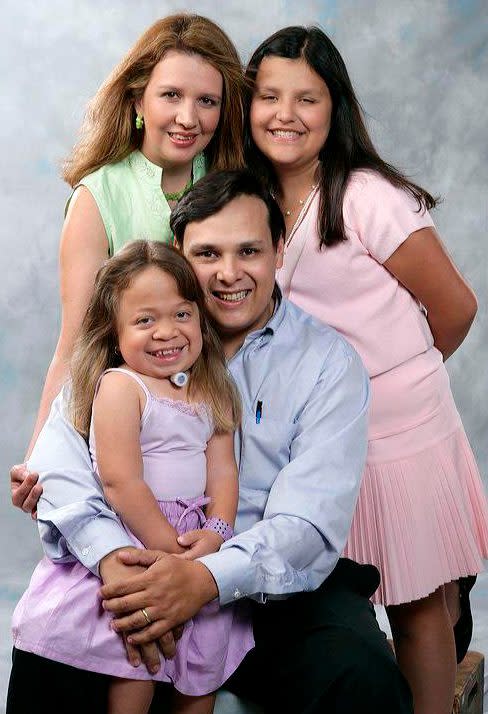She Beat the Odds Against a Rare Genetic Disease — Now She Could Die If Forced Out of the U.S.
Isabel Bueso should be dead already.
But for years she’s lived — thrived — with a rare genetic disease that doctors had once insisted would kill her by age 10. Bueso, now 24, has mucopolysaccharidosis type VI (MPS-6), which inhibits the body’s ability to process sugar, ultimately causing symptoms such as dwarfism, enlarged organs, impaired breathing and painful bone abnormalities.
There is no known cure. However, thanks in part to Bueso’s participation in a breakthrough medical trial in the early 2000s, there is an effective method of treatment. And so each week Bueso spends about six hours receiving life-saving infusions at the UCSF Benioff ’s Children’s Hospital in Oakland, California, not far from her home.
This has been her routine for the last 16 years — when she’s not in school (she graduated from California State University, East Bay, last year) or advocating for people with rare diseases (having spoken twice with lawmakers) or teaching dance to disabled patients at the hospital.
Bueso loves to dance, just as she loves the water and to cook — cupcakes and cheesecake, preferably, though she knows her way around a turkey — and she’s not shy about her favorite boy band, CNCO.
“I’ve never met somebody who embodies pure joy the way that she does,” says Justin Baldoni, whose four-year friendship with Bueso began after he featured her on his CW show following individuals with terminal illnesses, My Last Days.
“Despite everything she’s been through,” Baldoni says, “Isabel always has a smile on her face.”
Baldoni was compelled to speak out in a statement about Bueso because, for the last three weeks, she and her family have lived in a legal limbo due to her immigration status, with what her doctor said were life-or-death consequences.
• For more on Isabel Bueso’s health journey and immigration fight, subscribe now to PEOPLE or pick up this week’s issue, on newsstands Friday.
A Guatemala native, Bueso and her parents came to the U.S. in 2003 at the invitation of California doctors to participate in a clinical trial that eventually resulted in Naglazyme, a major treatment for MPS-6.
The family has been able to remain in the country for so long thanks to an immigration exception, known as deferred action, for people who are receiving critical health care.
In time, they saved for a small home. (Karla Bueso, Isabel’s mom, helps with her care, which is paid for by private insurance, while Isabel’s father supports the family as a sales manager.) A life grew around them.

“Isabel was expected to live no more than 7, maybe 10 years old. And now … she still has a lot of dreams for herself,” Karla says.
But last month, in a move seen as part of President Donald Trump‘s broader efforts to cut down on all kinds of immigration, U.S. Citizenship and Immigration Services said it would no longer be granting the exception that let the Buesos remain in the country.
This the agency announced to Isabel in stark terms, she says. She and her mom were leaving her usual Friday infusion on Aug. 16 when their lawyer called to explain a recent letter they had received from USCIS: “You have 33 days to leave” or could be targeted for deportation.
“My mom and I, we broke down to tears” at the “completely devastating” news, she says. “I cried really hard. I was shaking. I was pale.”
“The letter [didn’t] give us any alternatives,” Karla tells PEOPLE. There was no mention of an appeals process, and their lawyer’s letters to the government went unanswered.
After so long outliving death, long past what doctors had first promised, Isabel found herself powerless before the U.S. government. In a statement raising awareness about Isabel’s case, her doctor was frank: “If she were to return to Guatemala, she would no longer have access to the medication and she would die.”
The fight for Isabel’s life began. Baldoni posted a video of her with the hashtag #SaveIsabel, and within days celebrities including Lucy Hale, Eva Longoria and Gina Rodriguez had voiced their support. On Friday, 127 members of Congress asked the USCIS to clarify its policy.
The family’s immigration attorney, Martin Lawler, remembers what Isabel told another reporter recently: “I’ve been advocating for other people. Now I have to advocate for myself.”
RELATED VIDEO: OITNB‘s Diane Guerrero Urges Immigration Reform

On Monday, as PEOPLE was going to press, USCIS announced it was effectively reversing its decision and “re-opening” pending cases, claiming that Isabel and others who had received letters in August were not actually act risk of imminent deportation.
It’s a relief, if only a temporary one: Isabel will have to apply for another extension in two years and the government could reject her.
“It’s been so overwhelming, this whole situation,” she says. “But what I’ve been doing a lot is praying. Just praying every day, every minute of the day, to really find a solution.”
After learning her case was being re-opened, Isabel told PEOPLE in a statement, “Neither my condition nor my critical need for lifelong, weekly treatment will change in another two years’ time. We need to work together to find a more permanent solution that gives families like mine the guarantee that our lives won’t continue to be threatened.”
Still, Isabel is not shortening her bucket list. She plans on getting a master’s degree to make her a better advocate; she plans on taking more trips to San Diego; and she plans on spending more time on the beach, looking out over the ocean.
“She is a really strong woman,” a friend tells PEOPLE. “I’ve known her for a very long time, and she’s always looking to the positive.”
She looks now to her future.
“There’s so many things [I want to do],” Isabel says. “But I’m taking it step by step.”

